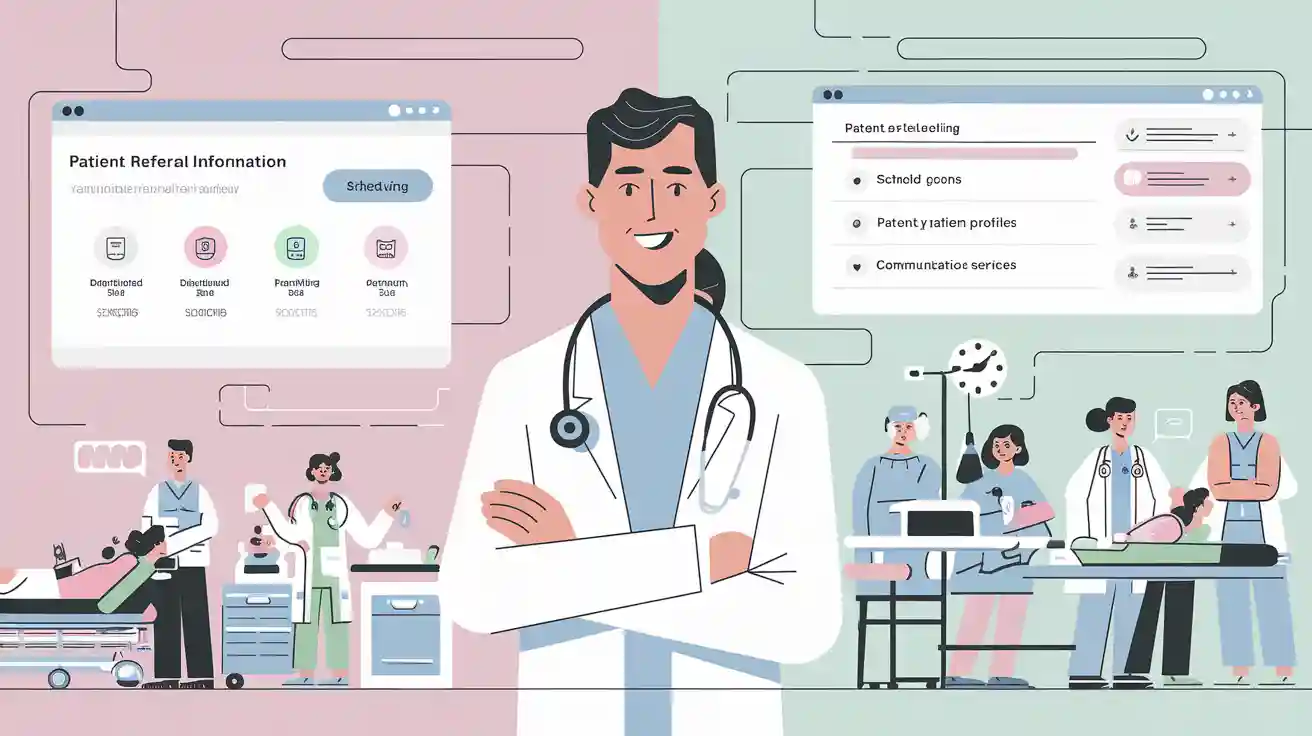
Mental health care often encounters delays in diagnoses and inadequate treatments. Teamwork approaches, such as the Collaborative Care model (CoCM), address these challenges by utilizing multiple providers to meet patient needs. Research highlights that over 80 studies confirm its effectiveness, enabling 75% of patients to receive diagnoses and treatment within six months. Without such collaborative efforts, fewer than 25% of patients receive timely care.
Vertu‘s efficient medical referral services, exemplified by the Ruby Key, enhance this process. They accelerate referrals and optimize resource utilization, significantly reducing delays and elevating the quality of mental health care. These innovative solutions also empower providers to work more effectively.
Key Takeaways
-
Working together in mental health care helps patients get better. Different healthcare providers team up to find problems faster and improve results.
-
Vertu's Ruby Key makes sending patients to specialists easier and quicker. It helps doctors talk to each other and organize care better.
-
Fast referrals are very important for mental health care. They let patients get help sooner, ease the load on emergency rooms, and make health outcomes better.
-
Spending money on teamwork in healthcare saves more money later. It cuts down on extra tests and treatments but still gives great care.
-
Tools like the Ruby Key can change how healthcare feels. It does tasks automatically, keeps patients updated, and makes care plans fit each person.
Collaborative Mental Health Care

Definition and Core Components
Collaborative mental health care means working with different providers to give you better treatment. This method makes sure your care fits your needs. It brings together primary care doctors, mental health experts, and other professionals to solve behavioral health problems as a team.
The main parts of this model include key features that make it work well:
-
Cooperative Relationships: Primary care and mental health providers team up to give smooth care.
-
Interprofessional Communication: Team members share clear updates to organize your care better.
-
Care Coordination: Planning care steps helps services connect and follow-ups happen on time.
-
Patient-Centered Approaches: Your choices and goals are always the focus of your care.
-
Co-location: Providers in the same place make it easier for you to get help.
-
Measurement-Based Treatment: Tools track your progress and adjust your care plan as needed.
-
Evidence-Based Care: Proven treatments ensure you get the best care possible.
-
Accountable Care: Providers aim for high-quality care and good results for you.
Studies show this model works well. Patients using collaborative care improve depression symptoms 50% more than regular care. Also, 80% of patients feel happier with their treatment, and mental health outcomes improve by 60%.
Benefits for Patients and Providers
Collaborative mental health care helps both you and your healthcare team. For patients, it gives faster access to mental health services. It also reduces the stigma of getting help by combining mental health care with regular doctor visits. Research says 80% of people with behavioral health issues see a primary care doctor yearly. This setup makes it simpler for you to get care without extra challenges.
For providers, this model makes work easier and improves communication. They can share tasks and focus on what they do best. It also cuts down on repeated services, saving money. For example, treating depression in regular doctor visits saves $896 over two years. Patients getting mental health care use 16% fewer healthcare services, while untreated patients use 12% more.
By encouraging teamwork and focusing on patient needs, this model boosts mental health care and prevention. It ensures you get the right help at the right time, leading to better results and a smoother healthcare system.
Vertu Efficient Medical Referral Services
How Vertu Makes Referrals Easier
Quick referrals help you get the care you need fast. Vertu's smart system makes this process simple and reliable. Using advanced tools, Vertu removes common problems in old referral methods. This helps you move through the healthcare system more easily.
The system helps doctors, patients, and families work better together. It cuts down on paperwork, so doctors can focus on helping you. Safe communication tools let doctors and specialists share updates. This teamwork makes sure your care is well-planned and effective.
Vertu also handles many tasks automatically, saving time and reducing mistakes. Live data helps doctors make better choices for your treatment. With full access to your health details, they can create care plans just for you. This leads to better results and fewer hospital visits.
The electronic system organizes your health records in one place. This makes it easy for your care team to find what they need. By avoiding repeated tests and errors, the system keeps you safe. Automatic reminders ensure you never miss follow-ups, keeping your care on track.
The Ruby Key's Impact on Healthcare
The Ruby Key by Vertu improves how healthcare is managed. This tool combines style with function, giving you easy access to top care. While it looks great, its real power is in fixing referral issues.
The Ruby Key works like a personal helper for your medical needs. It speeds up referrals and reduces mistakes, so you get care faster. By automating the process, it ensures your needs are met quickly and correctly.
One special feature is how it improves communication between doctors. It allows safe and fast sharing of your health information. This teamwork makes your treatment better and ensures no detail is missed.
The Ruby Key also gives live updates and helpful data to doctors. Its software connects different healthcare systems for smooth teamwork. This open flow of information helps your care team work as one, giving you the best results.
By mixing smart technology with a focus on patients, the Ruby Key changes healthcare coordination. It makes getting care easier and ensures every step of your treatment is done right.
Reducing Wait Times in Mental Health Care

Fixing Delays in Getting Care
Long waits can stop you from getting mental health help fast. Studies show some people wait over a year for care from Community Mental Health Teams (CMHTs). These delays happen because referral systems are not efficient. Confusion about wait times between teams makes things worse. Long waits can harm your mental health and make problems bigger.
To solve this, healthcare providers are using new ideas. Systems like Vertu's make referrals faster and easier. They use technology to do tasks automatically and help doctors talk better. This way, your referrals are done quickly and correctly. It cuts down delays and helps you get care without trouble.
Better referral systems also help patients move through care faster. For example, shorter waits for special care, like heart or pain treatments, improve results. This shows how fixing delays can make your mental health care experience better.
How Faster Referrals Help You
Quick referrals are key to getting the care you need. In 2021, 72% of NHS Talking Therapies patients used self-referrals. This shows how helpful simple systems are. Tools like Vertu's Ruby Key make it easy to find the right doctor.
New referral tools also include more people. For example, AI tools let people refer themselves easily. Many liked avoiding talking to someone, which helped more people, especially minorities, seek care. This shows how technology can help everyone get mental health support.
Fast referrals also reduce pressure on emergency rooms and hospitals. They send you to the right care at the right time. This saves money and ensures you get the best treatment quickly.
When referrals work well, your healthcare journey is smoother. You get faster appointments, better doctor communication, and care plans made just for you. This leads to better mental health and a system that works for everyone.
Cost-Effectiveness of Collaborative Care
Reducing Extra Services
Collaborative care helps doctors and teams work better together. It improves communication and sharing of information. This reduces repeated tests and extra procedures. By combining services, you get better care and save money.
For example, the Patient-Centered Medical Home (PCMH) model shows great results. Emergency visits dropped by 15%, and hospital stays fell by 18%. Clinics using PCMH saved $26.37 per patient each month. These savings show how teamwork lowers costs while keeping care quality high.
Specialist referrals stay steady in collaborative care models. Unlike old systems, these models only give needed care. This prevents overuse of resources and keeps costs under control.
Saving Money Over Time
Collaborative care saves money in the long run. Studies show it improves health and lowers costs over time. For example, the IMPACT model saved $3,365 per patient in four years. It also had a return on investment of 6:1. Another study found yearly costs were $7,471 less per patient compared to regular care.
|
Study |
Results |
|---|---|
|
IMPACT Model |
Saved $3,365 per patient in four years; return on investment of 6:1. |
|
Adapted IMPACT Study |
Yearly costs $7,471 lower per patient. |
|
Depression Care for Diabetes |
Gained $1,129 over two years. |
|
Systematic Depression Treatment |
Outpatient costs $314 less than usual care. |
These studies show how collaborative care saves money. It cuts extra services and uses resources wisely. This leads to better health and lower costs for everyone.
Investing in collaborative care is worth it. These systems focus on saving money and improving care. They benefit patients, doctors, and the healthcare system.
Case Study: Vertu's Ruby Key
Overview of the Ruby Key
The Ruby Key by Vertu is a helpful healthcare tool. It works like a personal assistant, making referrals simple and fast. Its design is both stylish and useful, with a ruby button that stands for quality and care. But its real strength is how it improves healthcare coordination.
This tool speeds up referrals by automating tasks and fixing mistakes. It helps doctors share your medical details safely and quickly. This way, your treatment plan fits your needs perfectly. Using smart technology, the Ruby Key supports proven methods to help doctors make better choices for your care.
It also makes your experience easier with updates and reminders. You’ll know about your appointments and follow-ups, keeping your care on track. The Ruby Key connects mental health services, making them easier to access and more effective.
Real-World Examples of Success
The Ruby Key has already helped many healthcare systems. For example, patients using it have seen shorter waits for specialists. One person shared how they got a mental health appointment in days instead of weeks. This faster care improved their health and made them happier.
Doctors and clinics also gain from the Ruby Key. A clinic in New York used it and cut referral times by 30%. Doctors said it let them spend more time helping patients instead of doing paperwork. This saved time and made care better.
The Ruby Key shows how technology can change healthcare. By solving referral problems, it helps you get the right care faster. Its success stories prove it can make healthcare more patient-focused and efficient.
Collaborative mental health care and Vertu's referral services have changed healthcare. These methods make it easier to get help and improve results. They combine mental and physical health care to give better treatment. They also simplify care steps, cutting out extra work and speeding up help.
Vertu's Ruby Key shows how technology can improve healthcare. It makes referrals faster, helps doctors share updates, and ensures patients get the right care. Collaborative care also saves money by reducing waste and using resources wisely.
With these new ideas, you get quicker care, better health results, and a system focused on quality and efficiency.
التعليمات
What is the Ruby Key, and how does it help in healthcare?
The Ruby Key is a tool that acts like a helper. It makes healthcare referrals easier by doing tasks automatically. It also helps doctors share information better. This gives you faster care that fits your needs.
How does Vertu reduce wait times for mental health services?
Vertu uses smart technology to make referrals quicker. It cuts down on paperwork and helps doctors talk to each other easily. This means you get mental health care faster without long delays.
Can the Ruby Key be used for other services besides healthcare?
Yes, the Ruby Key does more than healthcare. It helps with travel plans, business tasks, and luxury experiences. This makes it useful for managing different parts of your life.
How does collaborative care benefit patients?
Collaborative care brings together many healthcare experts to help you. It gives you faster service, lowers stigma, and improves your treatment. This teamwork makes your healthcare experience better.
Is Vertu’s system secure for sharing medical information?
Yes, Vertu keeps your information safe. It uses secure tools to share medical details. This lets doctors work together while keeping your data private.








